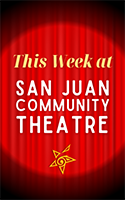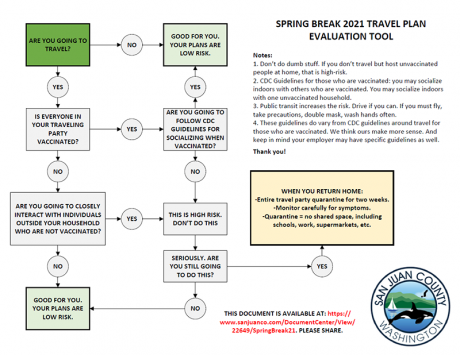Should You Travel During Spring Break? San Juan County Provides Advice
Posted April 4, 2021 at 5:00 am by Hayley Day
From San Juan County
Cases are rising across the United States, Washington and here in San Juan County.
No one knows for sure how steep this next wave of cases will be or how long it will last. The expectation is that it could be severe (variants + very relaxed precautions = more COVID), but the hope is that it will diminish by late spring (increased vaccine rates).
Good news: a majority of our most vulnerable citizens are now vaccinated. This will drastically reduce the number of deaths and should greatly diminish the strain on our healthcare systems.
Everyone, regardless of age, should be doing all they can to avoid COVID infection. COVID can still be a harrowing and long-lasting experience for anyone, even those who are not “high risk” or who have a “mild” case. The science is evolving quickly on “Long COVID”, but potentially 25% or more of those with mild COVID can still experience symptoms long after infection (go here if you want to dig into this in more detail). This is true for all age groups – even those between 18-40 years old.
A number of variants are spreading rapidly, including here in Washington. Some of these variants are quite concerning, potentially spreading more easily, and having higher fatality rates.
All of the vaccines appear to do a good job of preventing hospitalization and death from COVID, regardless of the strain of COVID.
Vaccine supply continues to be limited, and demand is still high. Fortunately, access continues to increase and hopefully will accelerate in the weeks to come.
Q: Should I Travel During Spring Break?
- Look at this simple guide to help you understand how to make good decisions around travel and keeping the islands safe.
Q: When Should I Get Vaccinated?
- Getting COVID is bad and puts you at risk for serious long-term health impacts, regardless of age, so you should vaccinate as soon as possible.
- There are specific benefits for those who are vaccinated regarding quarantine, socializing and travel.
- The variants develop in people infected with the disease. There is potential for a variant to evolve that eludes the vaccines. The more people vaccinated, the less likely this is to happen.
- Getting infected and spreading the disease can seriously impact others – including kids, who won’t be vaccinated for some time to come (and yes, some kids get very sick from COVID).
- The sooner we’re all vaccinated, the sooner we get back to normal. The sooner businesses can fully reopen, the sooner schools can return to regular operations, the sooner we can go watch a sporting event, go to a movie, or have a regular 4th of July parade.
- Those who aren’t vaccinated will likely face long-term restrictions around travel, access to specific events or work settings, etc.
Q: Can I Stop COVID Precautions?
- For the same reasons we need to get vaccinated, we need to continue masking up and avoiding high-risk behavior. Preventing infections is always the goal.
Q: I’m Fully Vaccinated. What Can I Do?
- You can socialize unmasked with others who are also vaccinated.
- You can socialize unmasked with others from a single household who are not vaccinated.
- If you are exposed to someone who tests positive, you do not need to quarantine.
- You can feel more at peace with your situation and the risks you choose to take. But your decisions still matter and keep in mind the comfort and safety of those not yet vaccinated.
You can support the San Juan Update by doing business with our loyal advertisers, and by making a one-time contribution or a recurring donation.
Categories: Health & Wellness, Safety











No comments yet. Be the first!
By submitting a comment you grant the San Juan Update a perpetual license to reproduce your words and name/web site in attribution. Inappropriate, irrelevant and contentious comments may not be published at an admin's discretion. Your email is used for verification purposes only, it will never be shared.